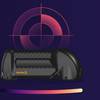Royal Canadian Navy to Use MIRRAS System
The developer of augmented and mixed reality technology Kognitiv Spark will be providing the Royal Canadian Navy with the opportunity to test drive a Mixed Reality Remote Assistant Support (MIRRAS) system, as part of a project that aims to improve maintenance and repairs aboard active naval vessels.
The project aims to validate technology adopted from Kognitiv Spark, whose software is designed for use with the Microsoft HoloLens.
The software leverages Augmented Reality, Mixed Reality, and the integration of Artificial Intelligence to improve efficiencies with ship operations including repairs, maintenance and knowledge transfer.
This system can be used by RCN Marine Technicians and Weapons Engineering Technicians, to ensure that RCN ships remain at a high-level of readiness for routine training and operational deployments.
“Innovation and technological advancement are critical to the future of the Royal Canadian Navy. We are continually seeking new ways to leverage emerging technologies in order to enhance our performance alongside and at sea,” said RAdm Casper Donovan, Director General Future Ship Capability, Royal Canadian Navy. “The Mixed Reality Remote Assistant Support system is an exciting tool, because it may provide our sailors with the opportunity to explore a new, and potentially much more efficient way of conducting onboard maintenance.”
For remote maintenance, a subject-matter expert using this system can see what the HoloLens wearer sees from anywhere in the world. The expert can provide guidance using real-time voice and video, interactive 3D holograms and content, and live IoT data. Alternatively, the technician can use locally stored data to assist with routine tasks when a remote expert is not available. The holographic support is designed to improve decision making by facilitating decisive action and reducing errors by providing clarity and certainty of comprehension.
“Our solution delivers a toolset that can take advantage of the most powerful visual processing system on the planet, the human brain,” said Duncan McSporran, a former military officer and the Co-Founder and COO at Kognitiv Spark. “3D interactive content is more easily interpreted than paper manuals, and therefore reduces any mental fatigue the soldiers, sailors or air force personnel might be facing under harsh and stressful conditions. Our software allows them to make better-informed decisions more rapidly, with all the information and resources possible in a secure system. We are delighted to deploy our Canadian solution, in support of the vision of the Royal Canadian Navy to introduce cutting edge technology.”
Kognitiv Spark was awarded this contract due in part to their industrial-leading security features and reputation from ongoing work with the Canadian Army and the Royal Canadian Air Force.
Kognitiv Spark recently won a Microsoft IMPACT award for Innovation with Hardware, a NATO Defence Innovation Challenge award for Mobile Apps for Defence Users and the Atlantic Canada Aerospace and Defence Association Industry Excellence Award.














